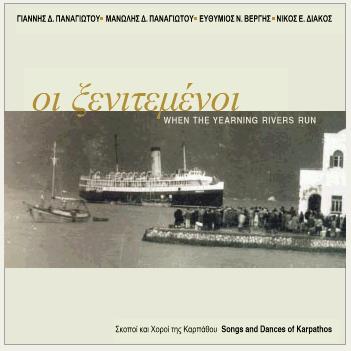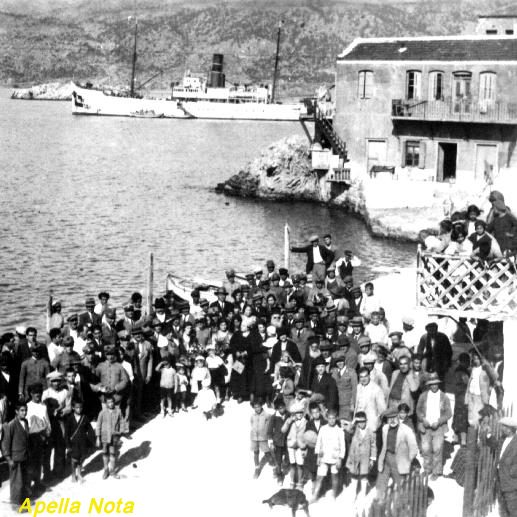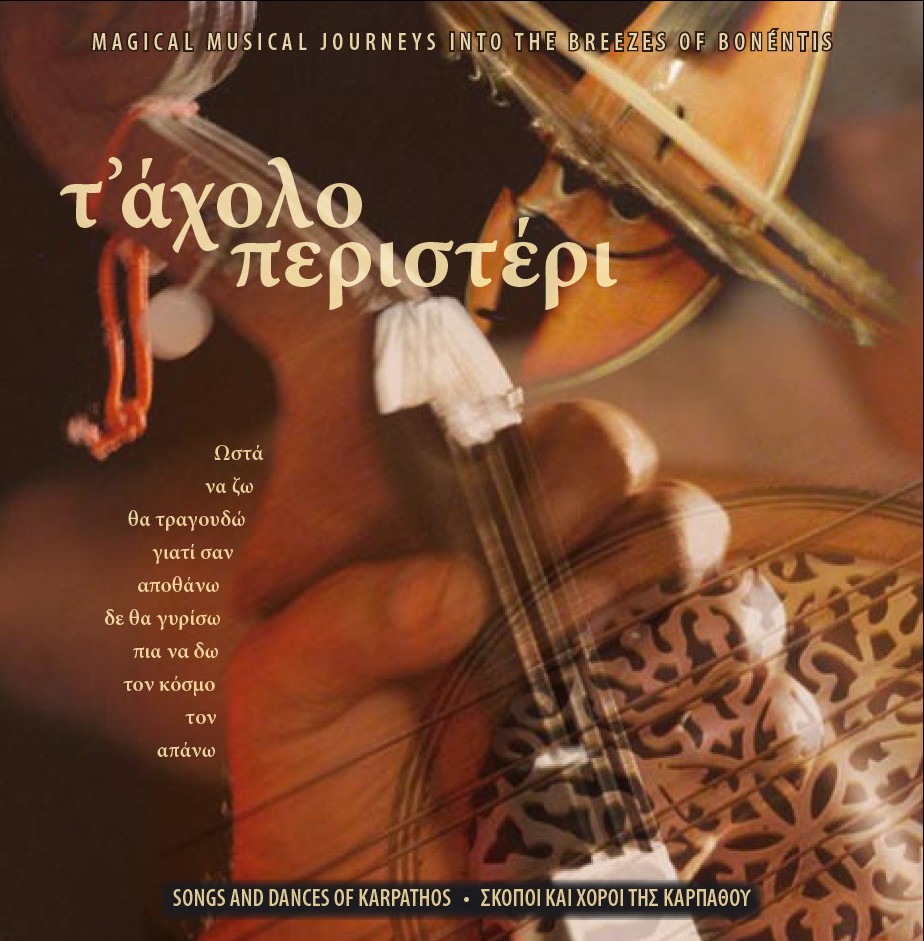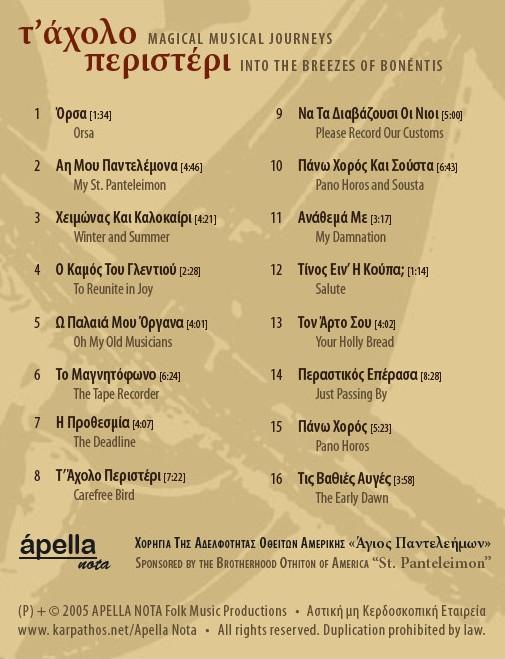Views: 89

Το CD «ξενιτεμένοι» (when the yearning rivers run) κυκλοφόρησε το καλοκαίρι του 2000 από την Άπελλα Νότα (AN101), ως επανέκδοση κασέτας με το ίδιο περιεχόμενο που είχε κυκλοφορήσει στη δεκαετία του ’80 στην Αμερική.
Η νέα έκδοση κυκλοφόρησε σε ψηφιακό δίσκο αφού έγινε η κατάλληλη επεξεργασία (mastering) για τη μεταφορά της από τις αρχικές ταινίες και προσετέθη βιβλιαράκι με πληροφορίες για το δίσκο, στίχους, ονόματα τραγουδιών, σκοπών και συντελεστές.
Ολόκληρο το album βρίσκεται στο youtube στο κανάλι του Γ. Λογοθέτη:
Κατάλογος τραγουδιών – SONG LIST
- ΔΙΛΗΜΜΑ [dilemma]
- ΝΟΣΤΑΛΓΙΑ [nostalgia]
- ΑΠΟ ΜΙΚΡΟΣ ΣΤΗΝ ΞΕΝΙΤΙΑ [i emigrated young]
- ΦΕΥΓΩ ΜΕ ΤΟ ΞΗΜΕΡΩΜΑ [i’m leaving at first light]
- ΚΑΙ ΠΑΙΡΝΩ Τ ΑΡΜΙΔΑΚΙ ΜΟΥ [searching for my love]
- ΠΛΑΝΕΥΤΡΑ ΞΕΝΙΤΙΑ [seductive foreign lands]
- ΣΟΥΣΤΑ και ΠΑΝΩ ΧΟΡΟΣ [karpathian dances]
Πληροφορίες έκδοσης – Publication Information
| lyre, vocals: [1, 2, 3, 5, 6]: | YIANNIS D. PANAGIOTOU |
| vocals: [1, 2, 3, 4, 6]: | MANOLIS D. PANAGIOTOU |
| lute: | EFTHIMIOS N. VERGIS |
| lyrics: | NICK E. DIAKOS |
| PRODUCTION | Apella Nota Folk Music Productions, Piraeus, Greece (2000) |
| RECORDING/MASTERING | Joel Katz, JADE Recordings, Fairlawn, NJ, USA (1987) |
| DIGITAL REMASTERING | Alan Douchess, WEST WEST SIDE MUSIC Englewood, NJ, USA (1999) |
| COVER DESIGN | LISA AELION, AELION DESIGN New York, NY, USA |
| ENGLISH TEXT | John T. Lagonikos, Pretoria, Republic of South Africa |
| PHOTOGRAPHS | Manolis G. Cassotis (from his archives), USA |
Αναστοχασμοί — Reflections
The music calls
I hear the voices start
I feel the wind beneath my exiled heart
As I soar above my dreams
To the place I belong
Where the cloud and mountain meet
Where the thirsty come to drink
The tears from their palms
That the Mother Mary weeps
When the music calls, when the voices start, when the yearning rivers run, the meaning of the word ξενιτεμένοι translates into the emotional turbulence of my heart.
It is the longing I feel. A pain that will not heal. A void that will not fill. It is the love that I have for the shores that I left, for the place of my birth.
It is a state of being ….. A commingling of longing and belonging.
It is this passion that this compilation of music and verse celebrates through poetic dialogue. This is in the form of rhyming verse (mandinathes), composed of two fifteen syllable lines of iambic rhythm, identical to that of Homer’s epics. It allows raw lyrical expression that churns and liberates restless emotions through uninhibited colloquy. The poetic verse is sung to different folk melodies (skopee) which vary in complexity, length and tempo.
The music is vibrant and puissant. Distinctive and evocative. It is played on traditional musical instruments. One of these, the lyre, is the successor to Apollo’s original lyra. Its legacy endures. Its benefaction touches all Karpathians. Its ancient, haunting echo plays on. Occasionally, Apollo selectively bequeaths God given talent to a chosen few of the lyre’s modern day exponents.
Οι Συντελεστές – The contributors

Yiannis D. Panagiotou is one of them ….. In his hands the lyre lives. From the wooden belly of this noble instrument he coaxes the sonorous bittersweet notes that entertained the ancient gods.

Accompanied by the lute (laoϊto) in the hands of the talented Efthimios N. Vergis, the patrimonial melodies and dances ignite the musical soul of Karpathians.

The lyrics touch and lacerate. They are autobiographical. The emotional outpouring of one of the ξενιτεμένοι ….. Nick E. Diakos. His words bleed from his melancholy spirit in poignant, lyrical imagery. He distils his own feelings of alienation into searing, poetic prose that communes with the restlessness of the ξενιτεμένοι.

Yiannis and his brother, Manolis D. Panagiotou, agitate and animate the nostalgic prose. Their intensely stirring vocal interpretation both wounds and caresses and builds bridges across the seas of separation to the place I belong ….. where the cloud and mountain meet ….. where the Mother Mary weeps.
They laud and lament, bare and share, the emotions of their people. Their beliefs and their ways and their love for their place. They weave together their pain and their joy, their laughter and their tears, into an intimate musical tapestry that is uniquely Karpathian.
The artistic rapport is inspirational. A collaboration of graces. The nameless graces Alexander Pope extols in his critical literary treatise “An Essay on Criticism.” In 745 lines of rhyming couplets written in iambic pentameter, Alexander Pope dramatically breaks this strict literary pattern, only once, to pay homage to man’s artistic exhilaration in these three lines of verse.
Music resembles Poetry, in each
Are nameless graces which no methods teach,
And which a masterhand ☨ can reach
From a different time, from a different place, his words cross cultural divides to acknowledge the creative exaltation of the human spirit. They do so now. Through them, I feel the presence of the nameless graces in the emotional dignity of this compilation. I hear them in the music ….. I hear them in the songs.
I salute this contribution to our musical heritage. God’s will there be more. That the musical footprints of these Karpathian artists meet again. That their musical graces mark the new millennium.
John T. Lagonikos☨
Εικόνες από το βιβλιαράκι — Booklet Images
The images included in the cover design of the CD and cassette are photographs of Pigadia, the main port of Karpathos, circa 1920 to 1935. It is where Karpathian emigrants embarked on the long and arduous journey to the foreign lands. It is also the place they longed to set their foot on whilst fulfilling their dream of returning to the motherland. The stage where pain and joy embraced for all to see.



(P) + © 2000 APELLA NOTA Folk Music Productions All rights reserved.



